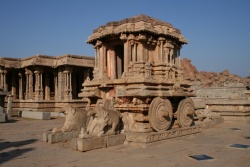Difference between revisions of "Yonakas"
| Line 8: | Line 8: | ||
1. [[Yonaka Dhammarakkhita Thera]]. He was sent to [[Aparantaka]] at the conclusion of [[Moggaliputtapissas]] Council (Mhv.xii.4). There he [[preached]] the [[Aggikkhandhopama Sutta]] and converted thirty seven thousand [[beings]]. Mhv.xii.34f.; Dpv.viii.7; Sp.i.67. | 1. [[Yonaka Dhammarakkhita Thera]]. He was sent to [[Aparantaka]] at the conclusion of [[Moggaliputtapissas]] Council (Mhv.xii.4). There he [[preached]] the [[Aggikkhandhopama Sutta]] and converted thirty seven thousand [[beings]]. Mhv.xii.34f.; Dpv.viii.7; Sp.i.67. | ||
| − | 2. [[Yonaka Dhammarakkhita]]. [[Teacher]] of | + | 2. [[Yonaka Dhammarakkhita]]. [[Teacher]] of [[Punabbasukutumbikaputta Tissa]] (q.v.) |
[[Yonaka Dhammarakkhita]] | [[Yonaka Dhammarakkhita]] | ||
| − | The [[word]] "[[Yona]]" in the [[Pali]] [[language]], and the analogues "[[Yavana]]" in [[Sanskrit]], [[Malayalam]], [[Marathi]], [[Kannada]], [[Telugu]] and [[Tamil]]; and "Jôbon" in {{Wiki|Bengali}}, are words used in [[ancient]] {{Wiki|India}} to designate {{Wiki|Greek}} speakers. "[[Yona]]" and "[[Yavana]]" are both transliterations of the {{Wiki|Greek}} [[word]] for "Ionians" (Homeric {{Wiki|Greek}}: Iaones, {{Wiki|Ancient Greek}}: *Iawones), who were probably the first [[Greeks]] to be known in the [[East]]. | + | The [[word]] "[[Yona]]" in the [[Pali]] [[language]], and the analogues "[[Yavana]]" in [[Sanskrit]], [[Malayalam]], [[Marathi]], [[Kannada]], [[Telugu]] and [[Tamil]]; and "Jôbon" in {{Wiki|Bengali}}, |
| + | |||
| + | are words used in [[ancient]] {{Wiki|India}} to designate {{Wiki|Greek}} speakers. "[[Yona]]" and "[[Yavana]]" are both transliterations of the {{Wiki|Greek}} [[word]] for "Ionians" (Homeric {{Wiki|Greek}}: | ||
| + | |||
| + | Iaones, {{Wiki|Ancient Greek}}: *Iawones), who were probably the first [[Greeks]] to be known in the [[East]]. | ||
| + | |||
| + | The [[Yavanas]] are mentioned in the [[Buddhist]] [[discourse]] of the [[Middle Length Sayings]], | ||
| + | |||
| + | in which the [[Buddha]] mentions to the {{Wiki|Brahman}} [[Assalayana]] the [[existence]] of the [[Kamboja]] and [[Yavana]] [[people]] who have only two [[castes]], [[master]] or slave. | ||
| + | |||
| + | The direct identification of the [[word]] "[[Yavana]]" with the [[Greeks]] at such an early time (6th-5th century BCE) can be doubted.[1] | ||
| − | |||
Examples of direct association of these with the [[Greeks]] include: | Examples of direct association of these with the [[Greeks]] include: | ||
| + | |||
The mention of the "[[Yona]] [[king]] Antiochus" in the [[Edicts of Ashoka]] (280 BCE) | The mention of the "[[Yona]] [[king]] Antiochus" in the [[Edicts of Ashoka]] (280 BCE) | ||
Latest revision as of 14:01, 29 February 2016
1. Yonaka Dhammarakkhita Thera. He was sent to Aparantaka at the conclusion of Moggaliputtapissas Council (Mhv.xii.4). There he preached the Aggikkhandhopama Sutta and converted thirty seven thousand beings. Mhv.xii.34f.; Dpv.viii.7; Sp.i.67.
2. Yonaka Dhammarakkhita. Teacher of Punabbasukutumbikaputta Tissa (q.v.)
Yonaka Dhammarakkhita
The word "Yona" in the Pali language, and the analogues "Yavana" in Sanskrit, Malayalam, Marathi, Kannada, Telugu and Tamil; and "Jôbon" in Bengali,
are words used in ancient India to designate Greek speakers. "Yona" and "Yavana" are both transliterations of the Greek word for "Ionians" (Homeric Greek:
Iaones, Ancient Greek: *Iawones), who were probably the first Greeks to be known in the East.
The Yavanas are mentioned in the Buddhist discourse of the Middle Length Sayings,
in which the Buddha mentions to the Brahman Assalayana the existence of the Kamboja and Yavana people who have only two castes, master or slave.
The direct identification of the word "Yavana" with the Greeks at such an early time (6th-5th century BCE) can be doubted.[1]
Examples of direct association of these with the Greeks include:
The mention of the "Yona king Antiochus" in the Edicts of Ashoka (280 BCE)
The mention of the "Yona king Antialcidas" in the Heliodorus pillar in Vidisha (110 BCE)
King Menander and his bodyguard of "500 Yonas" in the Milinda Panha.
The description of Greek astrology and Greek terminology in the Yavanajataka ("Sayings of the Yavanas") (150 CE).
The mention of "Alexandria, the city of the Yonas" in the Mahavamsa, Chapter 29 (4th century CE).
